Electoral collage
by Brett Marie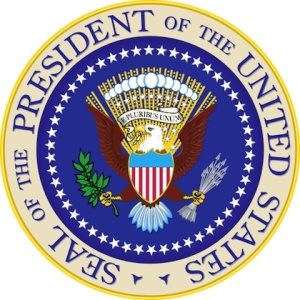 There is a form of mass hysteria sweeping the American populace at this moment. It’s something a bit like the Rage Virus, although those infected mostly stop short of physical violence and settle for just calling each other names and then blocking each other on Facebook. Watching it from across the Atlantic, I’d be terrified by it if I didn’t recognise it as just the quadrennial flare-up of Presidential Fever. Though this year it feels like a particularly nasty bout, I’m confident that we can bring it down to a manageable temperature by Thanksgiving. OK, I’m cautiously optimistic. Hopeful. Not panicking. Yet.*
There is a form of mass hysteria sweeping the American populace at this moment. It’s something a bit like the Rage Virus, although those infected mostly stop short of physical violence and settle for just calling each other names and then blocking each other on Facebook. Watching it from across the Atlantic, I’d be terrified by it if I didn’t recognise it as just the quadrennial flare-up of Presidential Fever. Though this year it feels like a particularly nasty bout, I’m confident that we can bring it down to a manageable temperature by Thanksgiving. OK, I’m cautiously optimistic. Hopeful. Not panicking. Yet.*
I’ve been through it before. I first voted for President in the 2000 US General Election (my guy lost), and I’ve voted in each one since. But here’s something funny: I have three citizenships. I can vote in England, where I live, but my ballot attendance here is spotty. I grew up in Canada, but I never bothered to register there. Yet every two years, for general and mid-term elections, I faithfully check up with the LA County registrar’s office and keep an eye out for my absentee ballot materials in the mail. Part of it makes sense: I identify as American, and that’s where all of my extended family lives. But there’s something more to it, a feeling of cultural imperative that I get from only one place.
It’s only natural that writers of fiction and narrative non-fiction should harness the political process as a vehicle for their stories, and that readers like me would eat those stories up.”
Though we suffer from chronic low voter turnout, American democracy is like a religion to its citizens. If you doubt me, take a look at the Lincoln Memorial, and consider the way it enshrines the so-called Great Emancipator and his invocation of “government of the people, by the people, for the people.” Like any religion, it seeks an exalted goal, but is presided over by an all-too-human clergy. More intriguing to me as a writer is that, like any faith, the best way we’ve found to perpetuate its message is through telling stories. And so when Donald Trump’s primary fight is described as a battle “for the soul of the Republican Party” or we hear predictions of a candidate’s victory as the end of the world as we know it, we shouldn’t be surprised at the biblical imagery.
It’s only natural that writers of fiction and narrative non-fiction should harness the political process as a vehicle for their stories, and that readers like me would eat those stories up. The messages churning out on the 24-hour news cycle are raw, messy, and require superhuman feats of punditry to spin into a coherent plot. But I can think of at least five books that take such chaotic raw material and fashion it into a meaningful narrative. The stories that follow (three fiction, one non-fiction, one a trippy in-between) have the advantage of being edited into a tidy, novelistic format. And, as an added bonus over the news, when these stories start to make you queasy, you can put them down and look away.
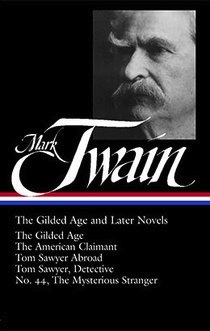 The Gilded Age: A Tale of Today by Mark Twain and Charles Dudley Warner
The Gilded Age: A Tale of Today by Mark Twain and Charles Dudley Warner
Anyone who believes that the rot of corruption is a new phenomenon in American politics should sample a few pages of this inspired piece of satire about land speculation and lobbying, from way back in 1873. Across six hundred pages, Twain and Warner present us with Washington as a sort of Sotheby’s of political favours, where the bidding runs high and a mild censure from colleagues is the ultimate punishment for a Congressman who puts his integrity on the auction block.
The Gilded Age hardly ranks among Twain’s greatest works, but its title did work its way into the history books, becoming a handy heading for the very era it depicted. But whole passages of it could be fairly easily updated to the Hillary era by swapping out a passé word or two (‘steamboat’, for example), for more modern jargon (say, ‘email server’). But here I must pause to salute Donald Trump’s pioneering spirit; in that whole book, I can’t find a nineteenth-century equivalent to “Grab ’em by the pussy.”
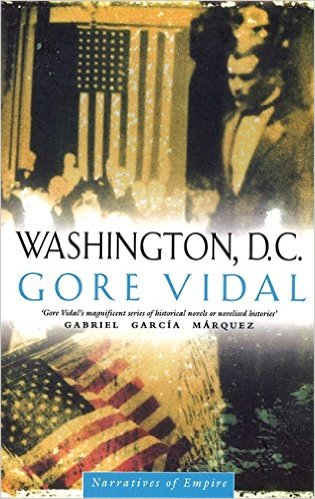 Washington, D.C. by Gore Vidal
Washington, D.C. by Gore Vidal
Few writers could claim to have an insider’s view of American politics as intimate as Gore Vidal’s. Born at the US Military Academy at West Point, reared in D.C., Vidal spent his formative years in the orbit of the power wielders and brokers he portrayed throughout his ‘American Chronicles’ (or ‘Narratives of Empire’) series of novels. To give an idea of his pedigree, as a youngster he was a Senate page, working in the same chamber where his grandfather served as a senator. Perhaps more than any other installment of the series – more than any other novel about life in the Beltway – Washington, D.C. encapsulates the essence of nation’s capital.
Painting a vivid panorama that spans from the Great Depression to the 1950s, Vidal draws his characters well – though he might be accused of using tracing paper. While the era’s actual giants (Roosevelt and McCarthy, to name two) are kept off-stage, Vidal creates obvious stand-ins for more than one real-life famous face. Most notable of these is the Kennedy-esque Clay Overbury, a raffish fortunate-son congressional aide who finds himself refashioned as a glamorous war hero and marched up the path to the Senate and beyond. But the character who stays with me is James Burden Day, the Southern senator with eyes on the White House, whose slow fade through the years quickly turns from poignant to tragic as the novel winds down. Vidal always viewed his country as more of an aristocracy than a republic; his Capitol Hill feels less like the government of the people than a bygone royal court. His well-to-do, well-connected key players maintain an air of propriety as they shift alliances and jockey for position. But propriety is a fragile thing; it can easily be shattered in the midst of a power play – and no one is safe from the fallout.
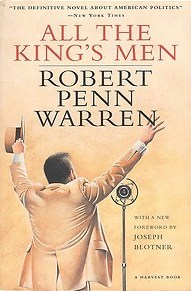 All the King’s Men by Robert Penn Warren
All the King’s Men by Robert Penn Warren
In many ways Robert Penn Warren’s magnum opus feels like the opposite of Vidal’s work, the story of a corrupt, populist Southern governor in the 1930s. While Vidal’s characters project an air of gentility, holding their daggers close under their vests, Governor Willie Stark (based heavily on real-life firebrand Huey Long) is the hurricane, the steamroller, or whatever other metaphor you want to use for destructiveness, ready to use blackmail and intimidation to bend his opponents to his will.
Like any great novel (and it is one of the best), All the King’s Men is too big for its genre. We watch Willie (commonly called ‘The Boss’) through the eyes of Jack Burden, a former reporter who gets absorbed into Willie’s political machinery, and while there’s enough politicking and intrigue to satisfy the buffs, the book gets a lot of its heft from the painful truths Jack learns as he watches the consequences of his actions. Much has been made of the book’s title as a reference to Long’s campaign slogan “Every man a king” but surprisingly I have yet to read a piece that points to the significance of the Humpty Dumpty rhyme from which it’s taken. Stark is seen at times like a raging god of myth, but by the book’s end he finds out the limits of what he and his men can do.
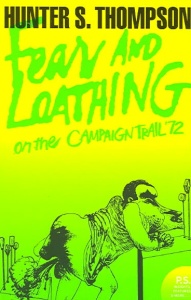 Fear and Loathing on the Campaign Trail ’72 by Hunter S. Thompson
Fear and Loathing on the Campaign Trail ’72 by Hunter S. Thompson
Stitching together the series of Rolling Stone articles Thompson wrote from the trenches of a campaign that saw the sixties counterculture’s nemesis Richard Nixon re-elected in a landslide, this other Fear and Loathing gives the gonzo journalism treatment to an electoral process which back then still had a veneer of civility. Uninterested in maintaining journalistic impartiality, Thompson picked his horse early, latching onto the long-shot campaign of the liberal Senator George McGovern early in the Democratic primary race. McGovern’s unlikely rise to the nomination made for an exciting story, and Thompson managed to capture the senator’s idealism amid proceedings which come out of his typewriter as somewhat of a freak show (a perception which cartoonist Ralph Steadman’s garish illustrations did nothing to dispel).
But Nominee McGovern’s game began to unravel following the Democratic Convention, with a scandal involving his VP pick. Thompson’s story shifted gears as he watched McGovern lose his bearings; the account of the senator’s fall soon took on a tinge of tragedy, mourning a little for what might have been as he careened across the country on buses and airplanes toward the campaign’s November demise.
 Only the Super-Rich Can Save Us! by Ralph Nader
Only the Super-Rich Can Save Us! by Ralph Nader
Ralph Nader has been called many things in his life: ‘lawyer’, ‘consumer advocate’, ‘hero’, ‘gadfly’ – and, after his failed 2000 presidential campaign, ‘spoiler’, ‘traitor’, and a whole host of words too coarse to repeat here. One term never used to describe him before the release of Only the Super-Rich Can Save Us! in 2008: ‘novelist’. And, for all the work Nader must have put into that 700-page behemoth, I doubt the term will make it into his obituary.
Having read every word of Only the Super-Rich…!, I won’t blame the New York Times for overlooking it when they sum up the life of the man who brought us seatbelts, airbags, the Clean Air Act, and (his detractors will tell you) President George W. Bush. The book is in many ways baffling. It’s essentially a heist novel, starring a band of real-life billionaires led by Warren Buffett who turn their massive wealth and clout to the task of bringing economic and social justice to America. Reading it, I find myself swimming in questions. Did Nader seek permission from his subjects before appropriating them? Did he intentionally write his chapter openings like the openings of a Batman episode? What are Buffett and his cohorts doing in superhero costumes on the cover? Most importantly, who slipped the acid in poor Ralph’s fair-trade coffee to make this book seem like a sensible vehicle for his message?
But the question I ask myself most frequently is this: Why am I enjoying this book so much? Only the Super-Rich Can Save Us! breaks just about every rule of good fiction writing. There’s virtually no conflict in any of its dialogue, the cast is constantly sitting down to lavishly-described dinners, the villains are straw men in suits, and there’s zero suspense as every scheme our heroes concoct goes off without a hitch. As a novel, it simply doesn’t work. And the years haven’t been kind to it – turns out Bill Cosby wasn’t the best choice of entertainer to round out the millionaire ensemble. But there’s something refreshingly hopeful and idealistic about casting wealthy, important people as caring and courageous crusaders looking out for everyday citizens, and it’s that sense of hope that keeps the pages turning. Even if it doesn’t quite chime with today’s events.
Probably the biggest flaw in the Presidential election cycle is that an enormous proportion of our attention to politics is focused on that one outcome every four years. Many of us simply tune out, in relief or disgust, once a winner is declared. That’s a pity, because the changes many of us would like to see happen would take a constant commitment, often carried over many years, to see through. This has always been Nader’s message, and his legacy (it’s heartbreaking to think that his 2000 presidential campaign might forever overshadow that). His novel is just a creative attempt to push this notion, an acknowledgment of the power of stories to do that when factual argument fails us. As with any great task, the first step to success is to visualise the result, and as clumsily contrived as the novel’s climax is, it’s a damn fine result to shoot for.
This is by no means an objective or comprehensive list (you were probably expecting Joe Klein’s Primary Colors), but these stories merely happen to have made an impression on me, even influencing my political perspectives. But two things tie these works together: the sense each one gives of how lofty our aspirations are to liberty and equality, and what a grand shame it is when we fall so far short. As America pulls the lever next Tuesday to put the 2016 campaign out of its misery, I hope these titles might tide political junkies over. But you’d better hurry if you want to read them all before Campaign 2020 starts. You have until Wednesday.
* Update: Election over. Trump elected. Panic button pressed.
 Brett Marie, also known as Mat Treiber, grew up in Montreal with an American father and a British mother and currently lives in Herefordshire. His short stories such as ‘Sex Education’, ‘The Squeegee Man’ and ‘Black Dress’ and other works have appeared in publications including The New Plains Review, The Impressment Gang and Bookanista, where he is a contributing editor. He recently completed his first novel The Upsetter Blog.
Brett Marie, also known as Mat Treiber, grew up in Montreal with an American father and a British mother and currently lives in Herefordshire. His short stories such as ‘Sex Education’, ‘The Squeegee Man’ and ‘Black Dress’ and other works have appeared in publications including The New Plains Review, The Impressment Gang and Bookanista, where he is a contributing editor. He recently completed his first novel The Upsetter Blog.
Facebook: Brett Marie
@brettmarie1979

